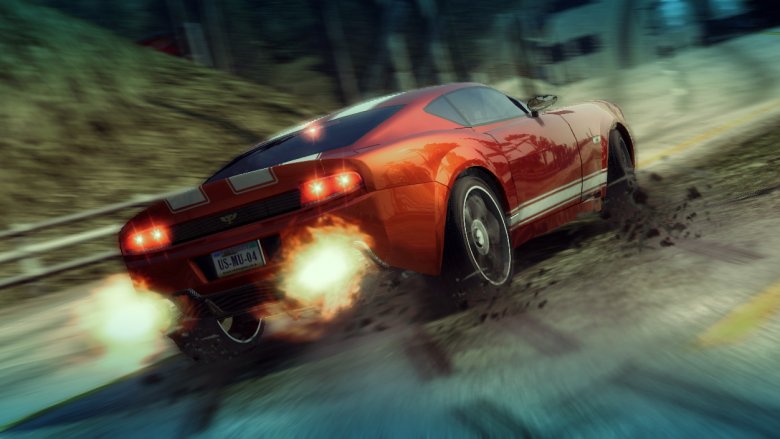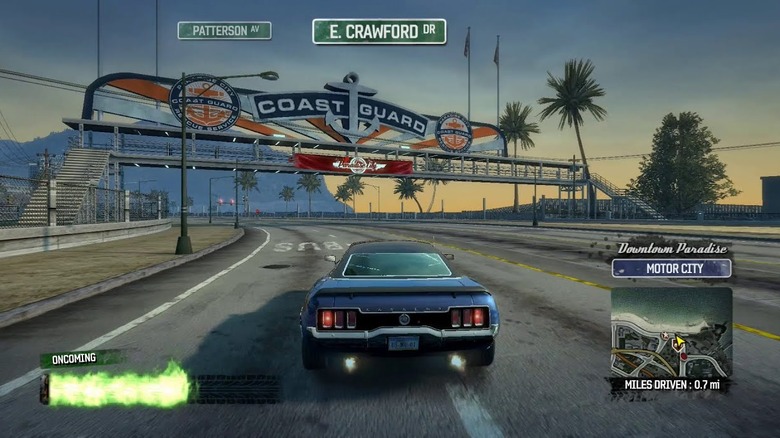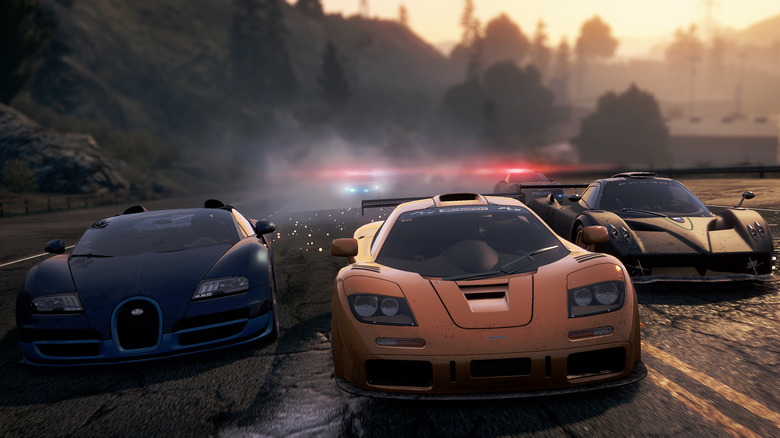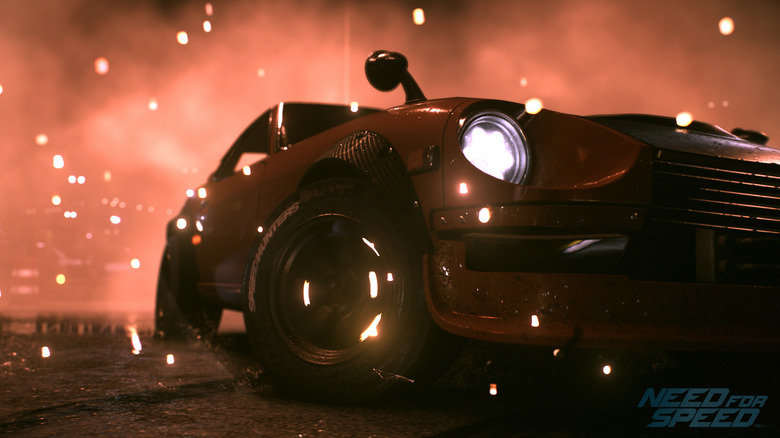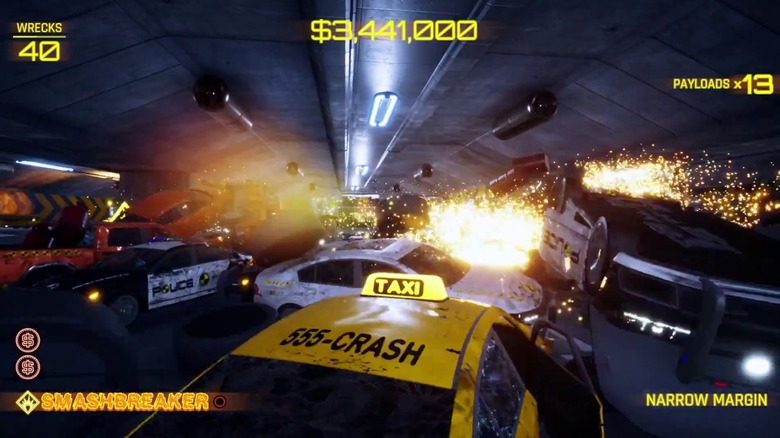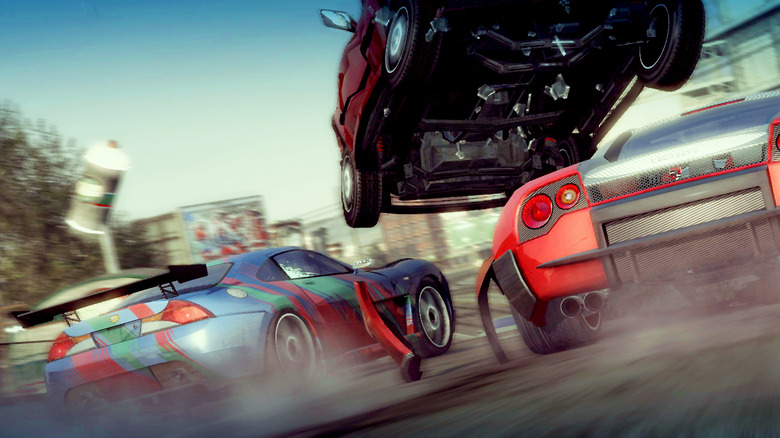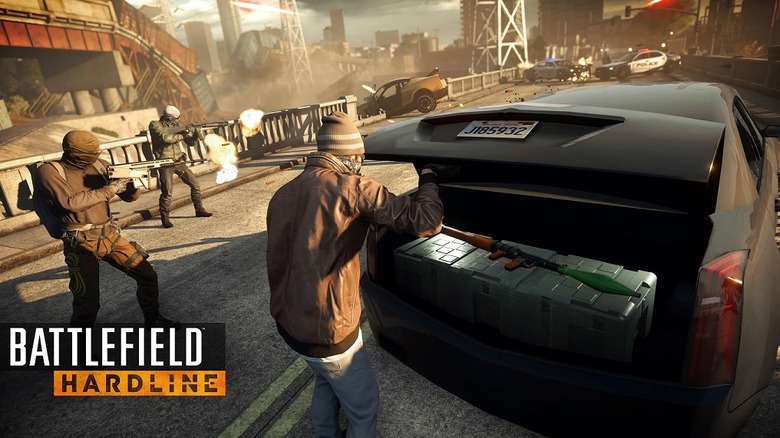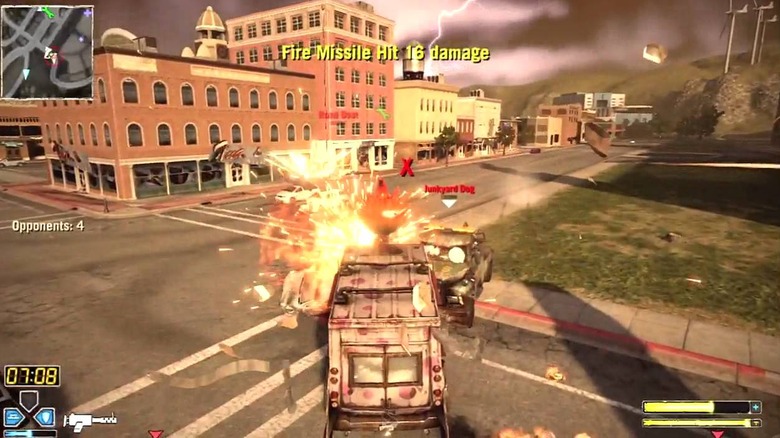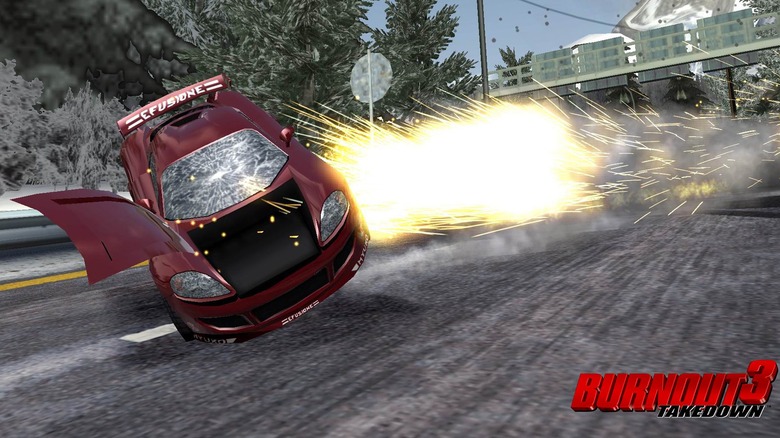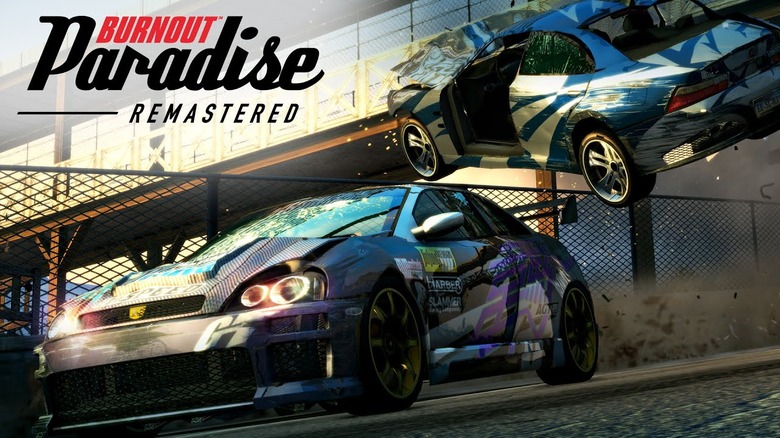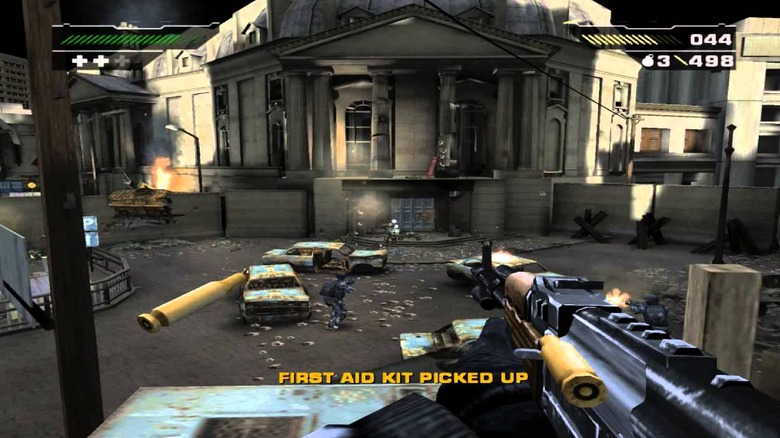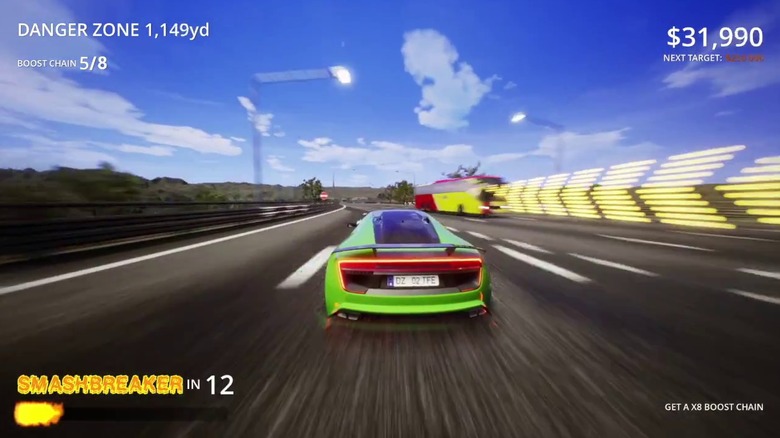Whatever Happened To The Burnout Games?
For much of the 2000s, Criterion Games' Burnout series dominated the arcade racing genre. Its blend of lightning-fast driving, slow-motion crashes, and killer soundtracks made for some phenomenal games that people still revere today. With five mainline games — Burnout, Burnout 2: Point of Impact, the critical darling Burnout 3: Takedown, Burnout Revenge, and Burnout Paradise — the series continually evolved and added unique, exciting features that kept gamers engaged.
Unfortunately, much to the chagrin of the gaming public, Burnout fell by the wayside once the 2010s came around, and it's been quite a while since the world has seen a new mainline entry from the series. It's something that hasn't sat well with many racing game fans, especially those who grew up on those games. It's almost baffling that, despite critical and commercial success, the beloved arcade racer seems to be gone for good. It makes you wonder: what exactly happened?
Burnout hasn't had a mainline series game in over a decade
Burnout Paradise released on Xbox 360, PlayStation 3, and Microsoft Windows on Jan. 22, 2008 in North America. As developer Criterion Games did with every game in the series, Paradise added some new elements while keeping its core — cars, crashes, and music — intact. With its latest entry, Criterion created a Burnout game in an open-world setting, allowing players to progress at their own pace, explore the gorgeous environments, and cause mayhem, all while breaking out of the confines of a linear path.
The game was well-received in the media, generating positive review after positive review on its way to an 88 Metacritic score. Regardless of critical reception, a AAA racing title needs to generate high sales to warrant another game, and Paradise did just that. The game sold a million copies in its first quarter and pushed series sales over 15 million. One would think that critical and commercial success would automatically lead to another entry in the series, but fans weren't so lucky.
Criterion began development on another racing series
When a huge publisher owns a game studio, the developer doesn't always make its own decisions about what to work on and when to work on it. For example, despite the success of Burnout Paradise, EA — who purchased Criterion back in 2004 — tasked the developer with creating a new entry in the Need for Speed series. Flash forward to EA's press conference at E3 2010, where the publisher announced Need for Speed: Hot Pursuit, a back-to-its-roots title featuring some of that much-loved Burnout style and panache.
Touted as a revolutionary entry in the series, Hot Pursuit was met with positive reviews, awards, and more than 5 million units sold in Q3 of 2010 alone. Another game was inevitable at that point. Flash forward again, this time to 2012, when Need for Speed: Most Wanted released to critical acclaim and solid sales. By then, it was pretty obvious that Criterion's focus would be on the Need for Speed series for the foreseeable future, and Burnout was all but burnt out.
EA gutted Criterion and shifted staff to new developer
After the first two Criterion-developed Need for Speed games were met with such great success, EA decided to assign around 80 percent of the studio's staff to work on the next entry in the series, Need for Speed: Rivals, with developer Ghost Games. A mere month later, Criterion co-founder Alex Ward broke the news that that 80 percent formed into a brand-new developer, Ghost Games UK.
Along with the announcement of Rivals came the unexpected news that Ghost Games would take full control as the lead developer for the franchise moving forward. In August of 2013, Rivals producer Marcus Nilsson confirmed that fact while mentioning that Criterion Games would be "working on something else." Ghost Games UK, in conjunction with Criterion, released Rivals in November of 2013 for PlayStation 3, PlayStation 4, Xbox 360, and Xbox One. Despite the staff retooling during development, the game was met with high praise and strong sales.
The founders of Criterion left to form a new studio
In January 2014, just a few months after EA took the majority of Criterion's staff and formed Ghost Games UK, Criterion co-founders Alex Ward and Fiona Sperry announced that they had left to seek other opportunities. After Ward himself announced that Criterion had lost the majority of its staff, the fate of the studio was in limbo for the rest of 2013 and many wondered what the two founders would do. Despite a mention of a new game, known then as "Project Zero," there was no clear path for Ward, Sperry, or Criterion as a whole.
Just two months after Ward and Sperry left, the duo announced their new studio, Three Fields Entertainment. The independent team would quickly go to work on a new IP for Xbox One and PlayStation 4. In 2016, that new IP came to fruition in the form of Dangerous Golf, an arcade golf game with a focus on crazy trick shots and Burnout-like destruction. Even though the game received just average reviews upon release, it helped fund the studio's next game, the car crash title Danger Zone.
EA and Criterion scrapped a Burnout successor in 2016
Even after Ward and Sperry left to form Three Fields Entertainment, EA and Criterion had a plan in place to create a successor to Burnout. During the summer of 2014, the studio announced that it was working on a new racing game, one focused on multiple vehicle types as well as a completely first-person point of view. EA showed off some early concept art and gameplay footage at its E3 2014 press briefing, which generated quite a bit of buzz. It was a new racing IP from the studio behind Burnout, after all.
However, nothing ever came of it. In June 2016 — just two years after the announcement — EA told Engadget that the studio had "moved on from the previous project they've spoken about and aren't pursuing it." Apparently, the "biggest game that Criterion's ever made" ended up taking a backseat to other EA endeavors.
Criterion moved from developing its own games to supporting other studios
After scrapping the racing title in 2016, EA put Criterion right back to work co-developing the Star Wars: Battlefront VR game with DICE. EA released the lengthily-titled Star Wars: Battlefront — Rogue One — X-Wing VR Mission just weeks after the main game dropped in the fall of 2016. Following up its work on that VR mission, the developer once again collaborated with DICE — as well as fellow EA studio Motive — on Battlefront 2, focusing on the game's space combat.
After successful stints on both Star Wars titles, Criterion continued to work with other EA studios on the publishers biggest titles. Most recently, the developer set out to create Battlefield 5's battle royale mode. Known as Firestorm, the yet-to-be-released mode aims to change the battle royale game through — you guessed it — vehicular combat.
The car destruction genre is mostly dormant
Vehicular destruction games were a huge part of the video game industry throughout the early 2000s. Sony struck gold with its demolition derby series Twisted Metal, while quirky titles like Cel Damage and Jak X: Combat Racing added a more cartoony aspect to car decimation. And of course, people praised the Burnout series for its revolutionary takedown system as well as its high-score-based Crash Mode.
Yet, nearly two decades later, car destruction games have lost their place in the industry. The latest example of a AAA car combat game was CodeMasters' OnRush. The fast-action multiplayer racer focused on a combat system that allowed players to gain speed boosts through destroying opposing vehicles. Critics praised it for its innovation and design. However, its commercial reception was nothing short of underwhelming, and its lackluster sales led to massive layoffs at Codemasters. Despite the industry's love for a series like Burnout, seeing a commercial reception like that likely doesn't help the chances of EA turning focus back to the series.
Auto companies don't want their cars destroyed in games
There's a lot of money to be made when it comes to developing racing games featuring real vehicles from real auto companies. For one, these games are fantastic means of advertising for car manufacturers that want to reach audiences in the digital space. It's such a lucrative advertising tactic that, if an auto company wants a particular car in a game, a studio can charge a pretty penny for that product placement. However, once an agreement like that is in place, the car company has a say in its vehicles' representation.
For example, Need for Speed: Payback partnered with auto companies to feature real-world vehicles. When working with these companies, developer Ghost Games constantly communicated with them, ensuring that crashes and car damage didn't go too far. Said Ghost Games' Bryn Alban to Engadget, "[Automakers] want to make sure the passenger compartment is always a safe place for the passengers to be. We can't have the doors open, and we can't crush the car too much."
It's easy to see why a publisher like EA would want to make a racing-focused Need for Speed game as opposed to something like Burnout. If NFS can make money through automotive partnerships, then why wouldn't those games be in constant development? Burnout wouldn't bring in those brand deals. In fact, in a Fast Company interview from 2017, Ford's licensing manager Mark Bentley explicitly said as much. He stated that the auto manufacturer would never work with a Burnout game because of the series' emphasis on car destruction.
EA still owns the Burnout license
Those hoping that Three Fields Entertainment could simply pick up the Burnout license will be displeased to know that EA still owns the franchise. Despite no new games since 2011's Burnout Crash!, the massive publisher hasn't given any indication that it would be willing to part with the license. However, it did somewhat satiate the demand for a new entry in the series when it released Burnout Paradise Remastered on the Xbox One and PlayStation 4 in March 2018.
With support for 4K monitors, 60 frames per second output, and all the game's original DLC, Remastered gave loyal fans an updated look at the last mainline entry in the series. However, it didn't give anyone much hope that the team at Criterion would soon be working on a new Burnout game. In fact, Remastered wasn't even remastered by the original studio. EA handed the job over to Stellar Entertainment, an England-based development team.
Criterion is now working on a melee-combat-focused IP
After finishing up its work on Star Wars: Battlefront 2's vehicular combat, Criterion Games began work on a new IP, centered around melee combat. How does the public know about this already? Well, it's thanks to a job listing that popped up on the studio's website in early 2018. The job called for a lead combat designer, someone who was passionate about "all types of combat in games but in particularly melee combat." It went on to mention that the right individual would have a passion for "action and action-adventure games."
The gaming public hasn't heard much about the IP since the news of the job listing broke, but it's something that could excite fans even though its not another Burnout. Criterion has experience developing combat-focused games. The 2006 first-person shooter Black, a departure from the studio's racing titles, released to positive reviews. Also, the team provided support on Battlefield Hardline's multiplayer mode, so it certainly has credibility when it comes to designing combat outside of cars.
Criterion founders are working on a Burnout spiritual successor
Those holding out hope for a new Burnout game aren't likely to see one developed by Criterion anytime soon. However, those looking for a successor to the franchise from the co-founders who created it will be happy to know that such a game exists. In 2016, Alex Ward announced that, along with Fiona Sperry and multiple other Criterion developers, Three Fields Entertainment would create a brand-new, full-fledged arcade racing game, titled Dangerous Driving. According to Ward, it is the team's "most ambitious title to date."
After finding some success with Danger Zone and Danger Zone 2, the studio's Crash-Mode-inspired titles, the team set its focus on creating a closed track, competitive racing game. "Dangerous Driving gets me back to making arcade racing," said Ward. "The kind of software I am most passionate about." Due out in 2019, this game may finally scratch that itch so many Burnout fans have had for more than a decade.

